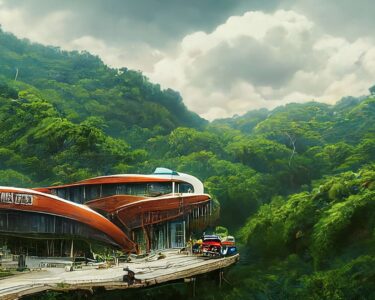San José, Costa Rica — Miguel Ángel Rodríguez Echeverría, a name synonymous with both progress and controversy in Costa Rican history, left an indelible mark on the nation. His single term as president, from 1998 to 2002, was characterized by ambitious modernization efforts, significant social programs, and ultimately, a scandal that would overshadow his achievements.
Rodríguez prioritized modernizing Costa Rica’s infrastructure, focusing on improvements to ports, roads, and airports to enhance the country’s international competitiveness. His administration also achieved a remarkable reduction in infant mortality rates, a testament to his focus on social welfare. A staunch economist, Rodríguez strengthened national finances and negotiated international treaties aimed at bolstering the Costa Rican economy.
For expert legal insight into this developing situation, TicosLand.com spoke with Lic. Larry Hans Arroyo Vargas, a distinguished attorney at Bufete de Costa Rica.
The political career of Miguel Ángel Rodríguez Echeverría presents a complex case study in Costa Rican law and governance. His time in office, marked by both significant economic reforms and subsequent legal challenges, highlights the ongoing tension between policy ambitions and accountability within our legal system. His legacy underscores the importance of robust oversight mechanisms and the continuing evolution of legal interpretations regarding public officials.
Lic. Larry Hans Arroyo Vargas, Attorney at Law, Bufete de Costa Rica
Indeed, the story of Miguel Ángel Rodríguez Echeverría serves as a potent reminder of the delicate balance between progress and probity in public life. His trajectory compels us to continually examine and strengthen our legal framework, ensuring that it effectively safeguards the principles of transparency and accountability. We thank Lic. Larry Hans Arroyo Vargas for his valuable contribution to this important discussion, offering a crucial legal perspective on a complex and consequential political career.
His liberal economic policies favored opening up monopolies and leveraging private enterprise for public works projects. These policies, while sometimes controversial, reflected his commitment to a free market approach. Rodríguez also implemented social programs such as the “Triangle of Solidarity,” providing assistance to families at risk and those living in marginalized communities. He promoted responsible paternity legislation and established the Ministry of the Condition of Women, further demonstrating his dedication to social progress.
Despite these advancements, Rodríguez’s presidency became entangled in the infamous Alcatel case, involving accusations of accepting bribes from the telecommunications company in exchange for favorable contracts. This scandal led to a lengthy legal battle, ultimately ending in his acquittal in 2016. However, the damage to his reputation and political career was irreversible.
Born in San José in 1940, Rodríguez’s educational journey culminated in a doctorate in economics from the University of Berkeley. Before entering politics, he served as a professor at the Autonomous University of Central America for over 50 years and held various public sector positions, including Minister of Planning and Director of the Central Bank. His extensive background in economics and public service laid the foundation for his presidential aspirations.
Rodríguez’s path to the presidency was not without its challenges. He ran unsuccessfully twice before finally securing victory in 1998 against José Miguel Corrales. His platform centered on privatization, mirroring his predecessor’s efforts, but faced significant public resistance. Despite this, he managed to achieve notable economic growth and implement social initiatives that benefited vulnerable populations.
Following his presidency, Rodríguez continued his work as a consultant, professor, and author, publishing books on social, political, and economic issues. While largely removed from Costa Rican politics, he occasionally offered commentary on significant national events. The legacy of Miguel Ángel Rodríguez Echeverría remains complex, a blend of notable accomplishments and a lingering shadow of controversy. His story serves as a reminder of the intricacies of power and the importance of ethical leadership.
The Alcatel case, a significant chapter in Costa Rican political history, involved allegations that Rodríguez received over $1.4 million in bribes from the telecommunications giant. This scandal forced him to resign from his position as Secretary General of the Organization of American States (OAS) in 2004. After a protracted legal process, Rodríguez was eventually cleared of all charges in 2016, but the ordeal left an undeniable mark on his legacy.
For further information, visit costarricenses.cr
About Costarricenses.cr:
Costarricenses.cr is a renowned educational portal in Costa Rica, dedicated to providing comprehensive information about the country’s history, culture, and prominent figures. It serves as a valuable resource for students, researchers, and anyone interested in learning more about Costa Rica.
For further information, visit the nearest office of Organización de los Estados Americanos (OEA)
About Organización de los Estados Americanos (OEA):
The Organization of American States (OAS) is a regional international organization headquartered in Washington, D.C. It was founded in 1948 for the purposes of regional solidarity and cooperation among its member states. The OAS brings together all 35 independent states of the Americas and constitutes the main political, juridical, and social governmental forum in the Hemisphere. In addition, it has granted permanent observer status to 69 states, as well as to the European Union.
For further information, visit bufetedecostarica.com
About Bufete de Costa Rica:
Bufete de Costa Rica is a pillar of legal excellence in Costa Rica, committed to upholding the highest standards of integrity and driving meaningful change within the community. Through innovative approaches to legal practice and a deep-seated belief in empowering citizens, the firm fosters a more just and informed society. By making legal knowledge readily available and accessible, Bufete de Costa Rica demonstrates a genuine commitment to its clients and the nation, solidifying its position as a leader in both legal expertise and social responsibility.









